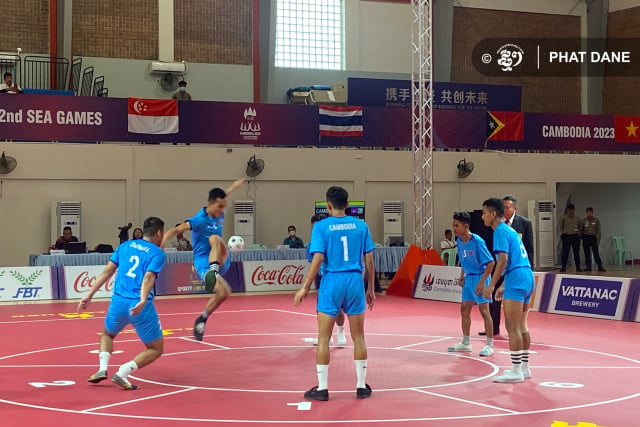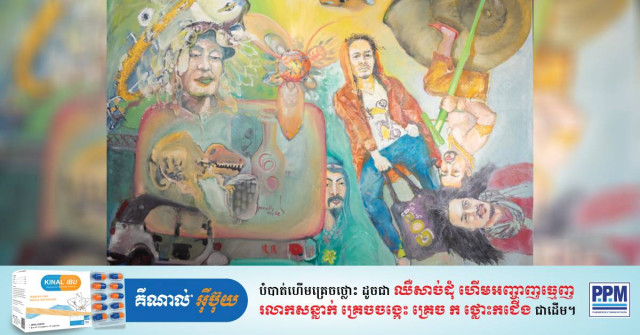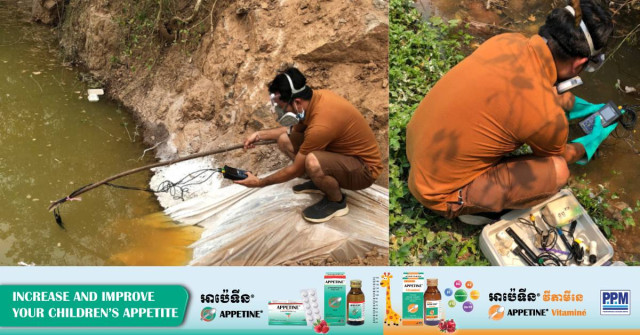Cambodia’s Chinlone Teams Performed Better Than Expected: Coach

- By Meng Seavmey
- and Phat Dane
- May 10, 2023 11:07 AM
PHNOM PENH – As the Chinlone competitions came to an end on May 9, Cambodia’s coach stressed out the country performed remarkably well and climbed to second place in the sport’s provisional ranking, just behind uncontested leader Myanmar.
The country host of the 32nd Southeast Asian (SEA) Games won a total of 11 medals, of which 4 are gold, 1 is silver and 6 are bronze. Myanmar only gathered a total of 8 rewards – 4 gold, 3 silver and 1 bronze – but came in second more often than Cambodia, which allowed it to take the lead in the ranking.
With such results, Cambodia’s men’s and women’s Chinlone teams have already surpassed their coach’s expectations, who expressed his delight on May 9.
“There were a total of 11 gold medals in Chinlone, of which Cambodia took four. Myanmar also won four of them, while Thailand got two and Laos one. Such a result is very good, it is beyond our expectations. We thought we could only get 2 to 3 gold medals,” said Cheat Khemera, the coach of Cambodia’s Chinlone teams.
He added that Cambodia almost got another silver medal, but ended up losing to Lao by 1 point because the players were already overjoyed and might have been a little distracted for the last game of the men’s Chinlone Non-Repetition Secondary discipline on May 9.
“Regardless, we are happy to accept the defeat and received the bronze medal. In the coming days, Cambodia’s men’s and women’s teams will compete in other disciplines and will have new chances to win gold medals,” Khemara said referring to Sepak Takraw, whose first competition start on May 10. “The players will continue doing their best for the country.”
Chinlone is a traditional Burmese game, first introduced in the SEA Games in 2013 when the regional competition was held in Myanmar. It consists of six people in a circle passing a light ball among them without using their hands.
Even though it has some specificities, the broad goal of the game is simple: Do as many passes as possible without the ball touching the ground, in two sets of ten minutes. Traditionally, the ball is made of rattan but modern ones are often in plastic.
While Chinlone is typically Burmese, a slightly different version of the sport, called Sepak Takraw, is spread across Southeast Asia. Often referred to as kick volleyball, it consists of two teams playing against each other on a badminton-like court. The goal is to launch the ball on the opponent’s side, over a net, without using the hands.
There are variants of the game, where the goal is to place the ball in a basket above the ground.
While Chinlone events are over, Sepak Takraw is only starting on May 10 and will run until May 16.
Special training for special results
The men’s team consists of 18 players, while the women’s team includes 12 players, all competing in both Chinlone and Sepak Takraw events.
To maximize Cambodia’s chances to gather medals in the two sports, the teams trained in the country for six months before moving to Myanmar for the last five months prior to the 32nd SEA Games, to learn from the bests.
“Thus, our players were able to become good enough to compete with other countries’ players,” he said.
As coach of Cambodia’s national teams, Khemara praised his home country’s preparation for the SEA Games, which allowed him to show his ability as a coach and to lead the teams to four victories.
“Chinlone will be included in the next SEA Games, too. As long as there is Chinlone, there will always be a possibility for Cambodian players – who will get better and better – to win the gold medals,” he stressed out.
In Chinlone Non-Repetition Primary discipline, Cambodia won three gold medals for the men, women, and mixed on May 6.
The following day, in Chinlone Same Stroke discipline, Cambodia took the gold in Mixed, the silver in Women’s and the bronze in Men’s categories.
Finally, Cambodia’s mixed Chinlone team claimed the bronze medal in the Mixed Chinlone (linking) on May 8, and both teams got bronze medals in the Chinlone (Non-Repetition Secondary) on May 9.















